Accidents in the crate aren’t uncommon in puppies. Firstly, they still have difficulty controlling their bladder. Second, crate training is not easy, and the wrong technique can ruin everything.
If your puppy keeps peeing in the crate, you must look for the cause in the environment or mistakes in crate training. Then you need to use a comprehensive approach to correct the situation.
Contents
- Top reasons why puppies pee in their crate
- How to stop your puppy from peeing in the crate
- 1️⃣Clean the crate thoroughly and remove any odor
- 2️⃣Stick to an established routine
- 3️⃣Use positive reinforcement training
- 4️⃣Refrain from using pee pads
- 5️⃣Change the crate
- 6️⃣Change the bedding
- 7️⃣Reduce anxiety and stress
- 8️⃣Help your puppy love his crate
- 9️⃣Gradually increase the time
- 🔟Don’t keep your puppy in the crate too long
- Conclusions
- FAQ
- How long can a puppy hold it’s bladder in a crate?
- Should I punish my puppy if he pees in the crate?
- Is it okay to use pee pads in the crate?
- What to do if my puppy pees in the crate overnight?
- How can I tell if my puppy is scared or stressed in the crate?
- Why does my puppy pees in his crate after being outside?
Top reasons why puppies pee in their crate
If your pup has accidents in the crate, the first thing to think about is that he may not be able to control his bladder. So don’t sound the alarm right away if it’s just an occasional accident.
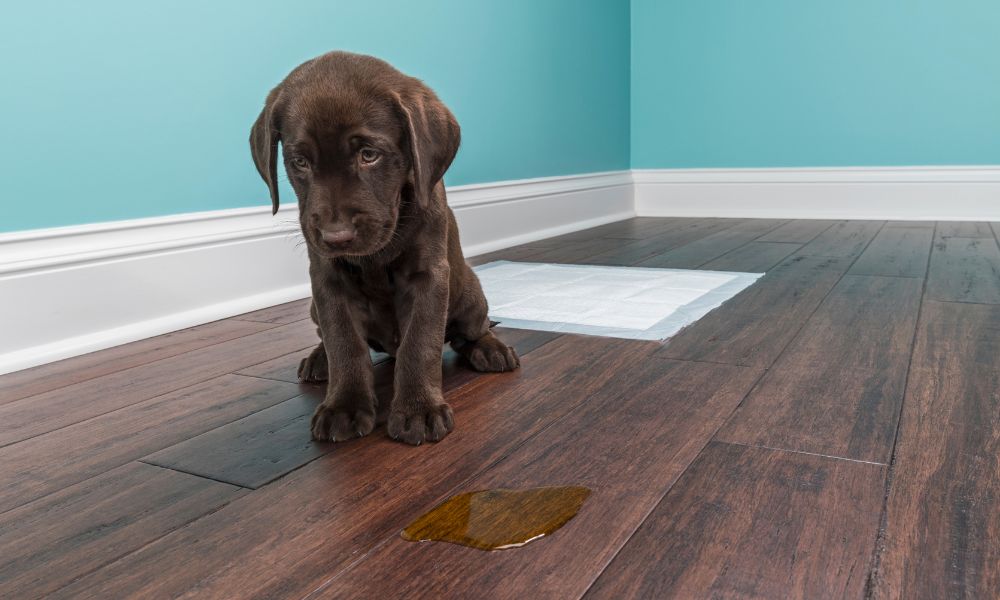
But if a puppy systematically pees or poops in the crate, it may be due to the following reasons:
- 👉faulty crate training (for example, some people don’t let the puppy get used to the crate and close it for a long time);
- 👉aversion to the crate (perhaps your puppy doesn’t like the crate and messes it up to protest);
- 👉pee pads using (these things confuse the puppy and make him think it’s okay to go to the bathroom in the crate);
- 👉anxiety or stress (dogs that have experienced a traumatic event or those who have been punished for accidents may pee out of fear);
- 👉inappropriate crate size;
- 👉excessive confinement in the crate;
- 👉medical issues and taking certain medications. Chances that your puppy will pee not only in his crate, but in other areas of the house as well.
Relater article: puppy peeing in the house - what to do?
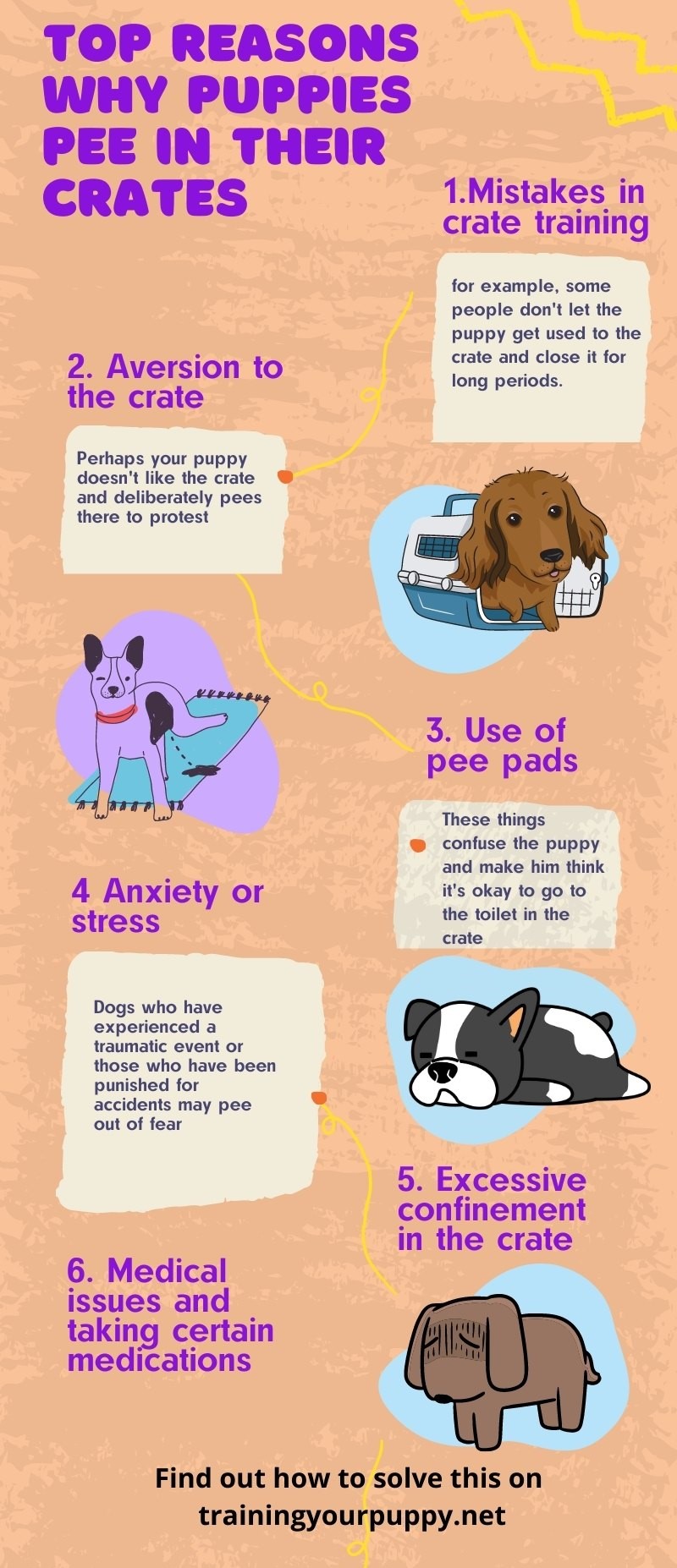
If this is the first time your puppy has peed in the crate, consider what might have changed Are there other changes in his behavior? Or maybe he just drank a lot of water and couldn’t contain himself? Don’t scold him, but keep watching him.
How to stop your puppy from peeing in the crate
If you have the impression that your pet pees in the crate too often, there may be an illness behind it, such as a urinary tract infection. Therefore, the first thing you should do is contact your veterinarian.
If your pup is healthy, you can move on to the next steps. The following 10 tips can help puppy parents, and also if your older dog is peeing in the crate.
Read also: Should you close a puppy crate at night?
1️⃣Clean the crate thoroughly and remove any odor
If your dog smells urine, it will encourage him to do his business in that spot again. Therefore, you must remove it.
To do this, you can use a special cleaner from the store. You can also make it yourself at home.
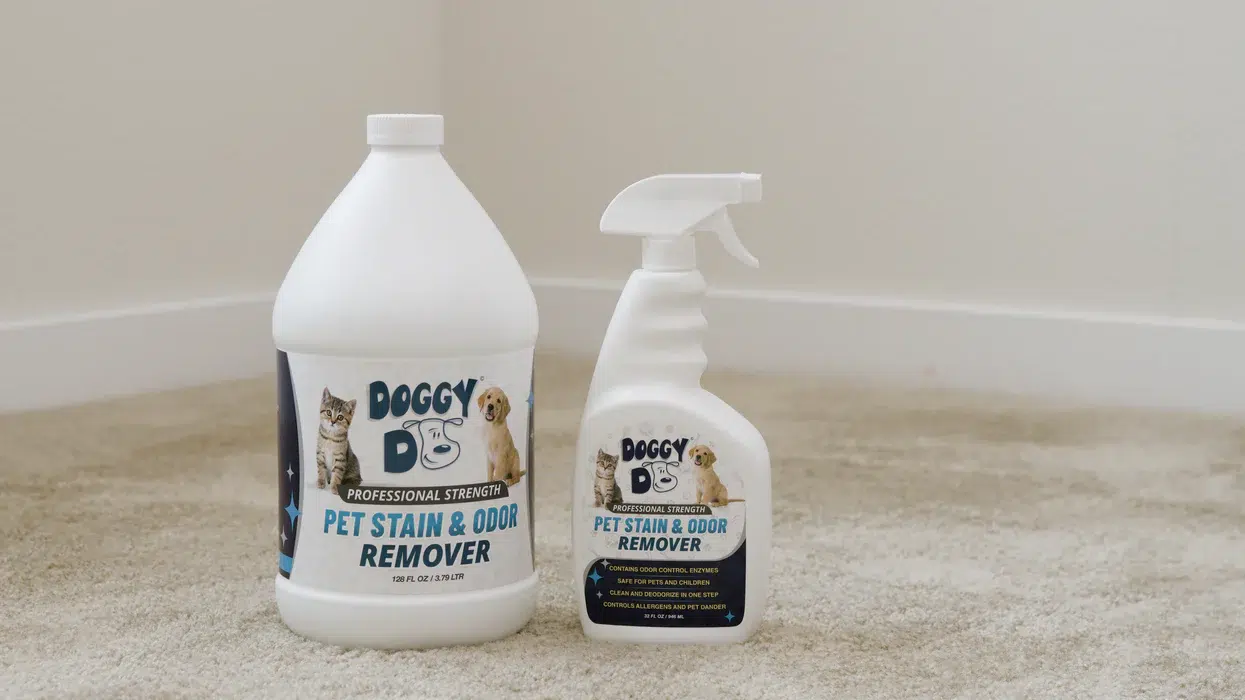
Here’s a simple recipe for a dog urine odor remover:
- Mix 1/2 cup of hydrogen peroxide with 1 teaspoon of dish soap and 1 tablespoon of baking soda in a spray bottle.
- Shake the spray bottle well to mix the ingredients.
- Spray the affected area with the solution and leave it on for 15-20 minutes.
2️⃣Stick to an established routine
To discipline your furry friend, you need to stick to a set routine. Try to take him for a walk and feed him at the same time every day. Don’t put your puppy in his crate until he has been walked and done his business.
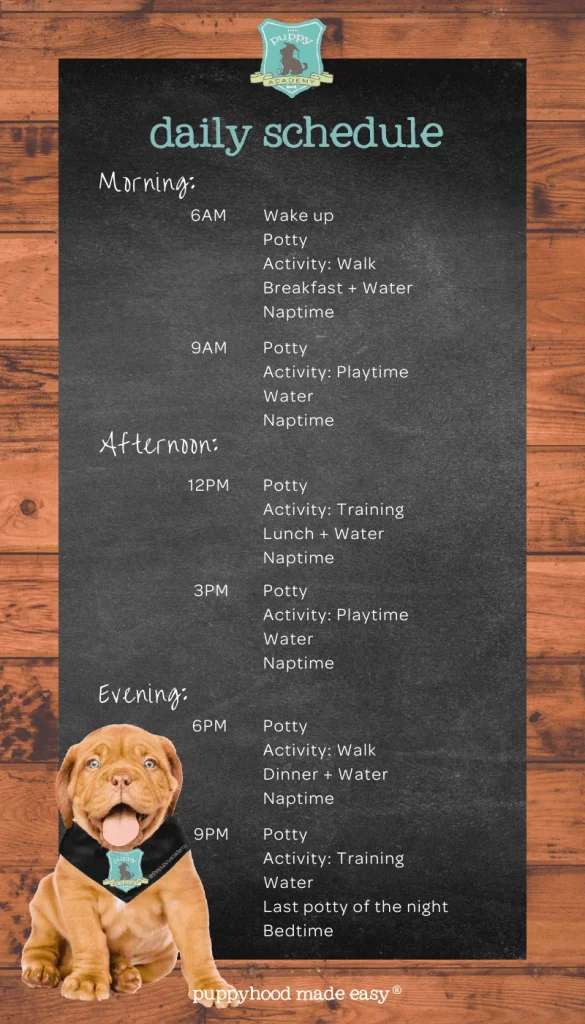
Remember that things aren’t so simple with little puppies:
Comment
by u/Ocean_Lover9393 from discussion Puppy pees in crate despite being taken out every 2 hours, used to whine to communicate toilet time, now happily pees inside the crate?
in puppy101
It’s important to closely supervise your puppy during potty training to avoid accidents and reinforce good behavior. You’ll be able to react quickly if you notice anything wrong.
3️⃣Use positive reinforcement training
Punishing your puppy for accidents can cause fear and anxiety. This often has the opposite effect, and dogs start peeing everywhere. Therefore, rely on positive reinforcement by rewarding good behavior instead of punishing.
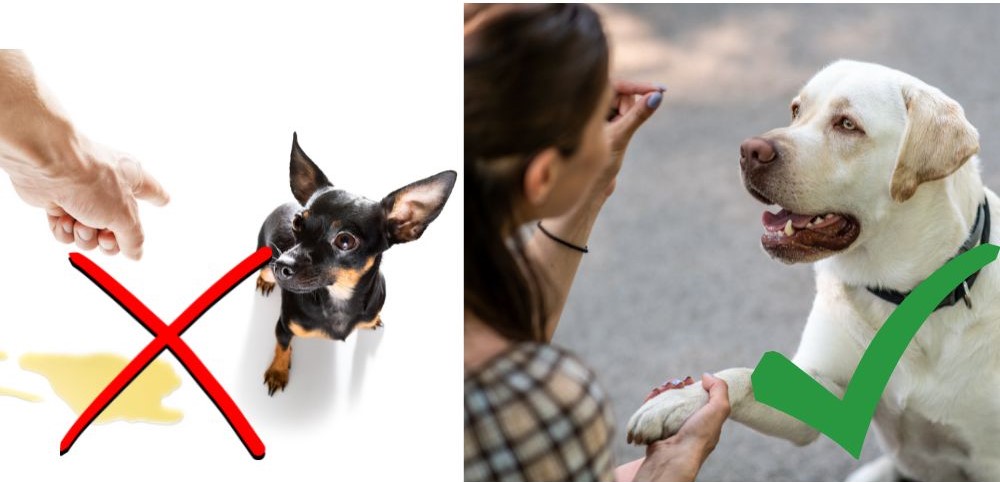
Positive reinforcement training can help reduce stress and anxiety by creating positive associations with certain experiences. Reward your puppy with treats and praise when he goes to the bathroom in the right place or behaves well in the crate.
4️⃣Refrain from using pee pads
Pee pads can be useful in housetraining, but they shouldn’t be used in the dog crate. They can confuse the puppy about where to do his business. Puppies may also develop a preference for peeing on the pad, making it more difficult to get them used to peeing outside.
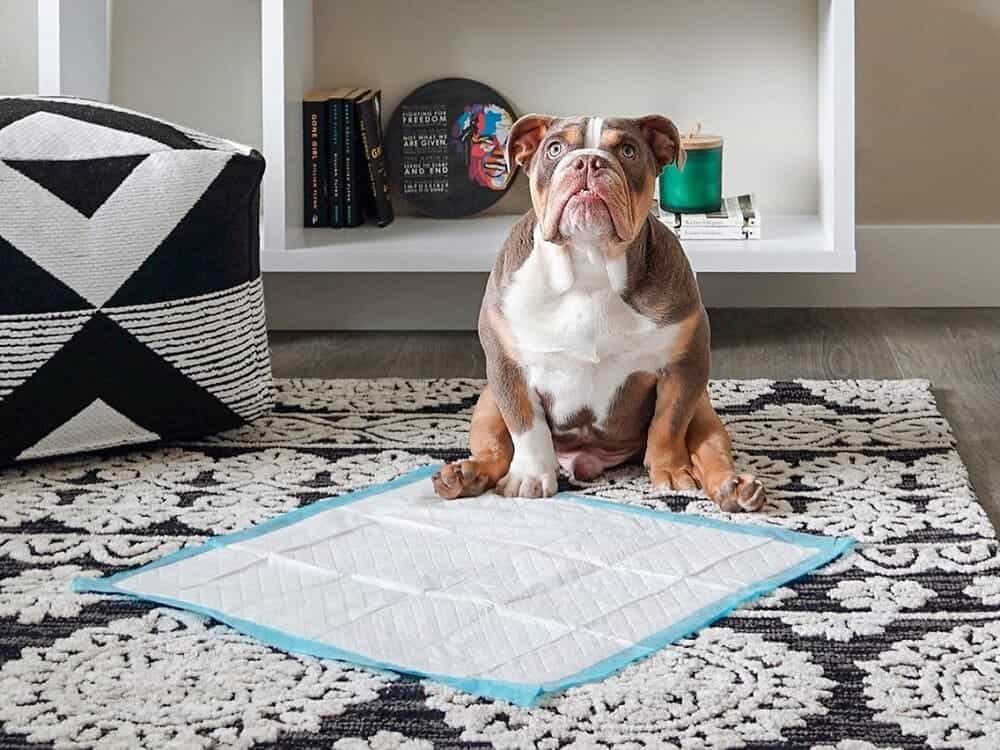
In addition, puppies have a natural instinct not to defecate in their sleeping area. When you place a pee pad in the crate, you’re asking your puppy to do his business in the same place he sleeps. It’s better to teach your puppy to go outside to potty.
5️⃣Change the crate
Perhaps this crate is too big for your puppy? If it has a corner where your dog can pee in addition to his bedding, you need to make that area smaller. Possibly you could use a divider.
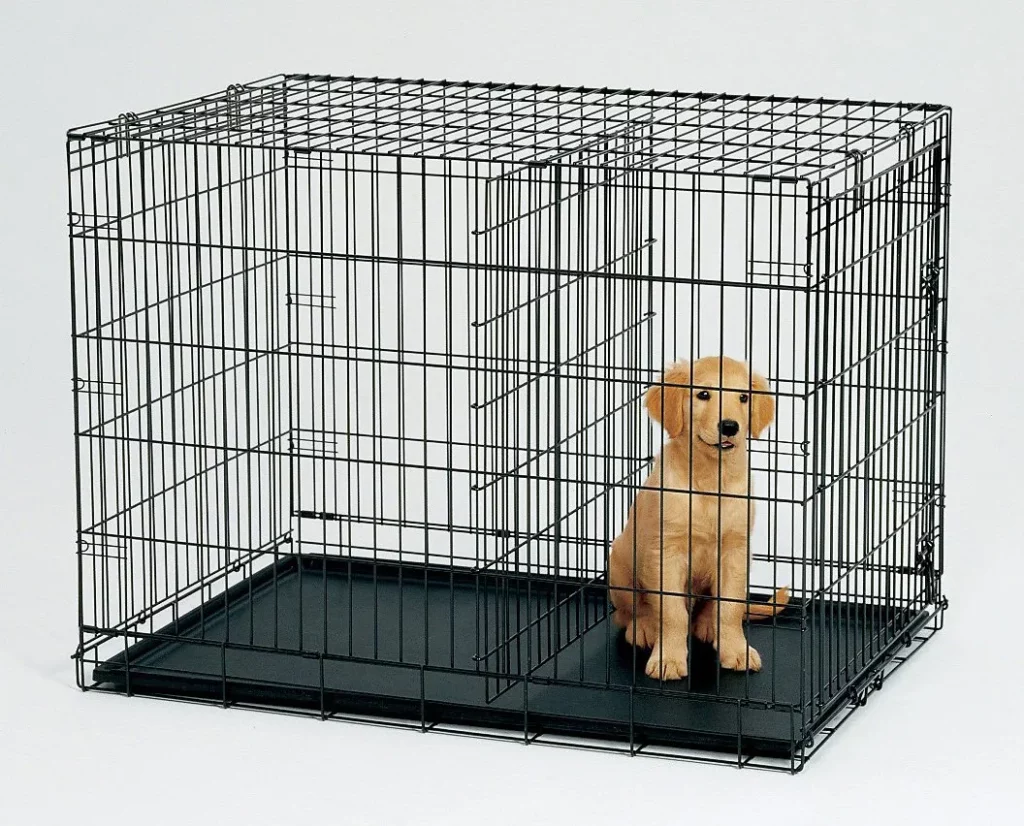
Here’s what one dog owner says about it on a dog forum:
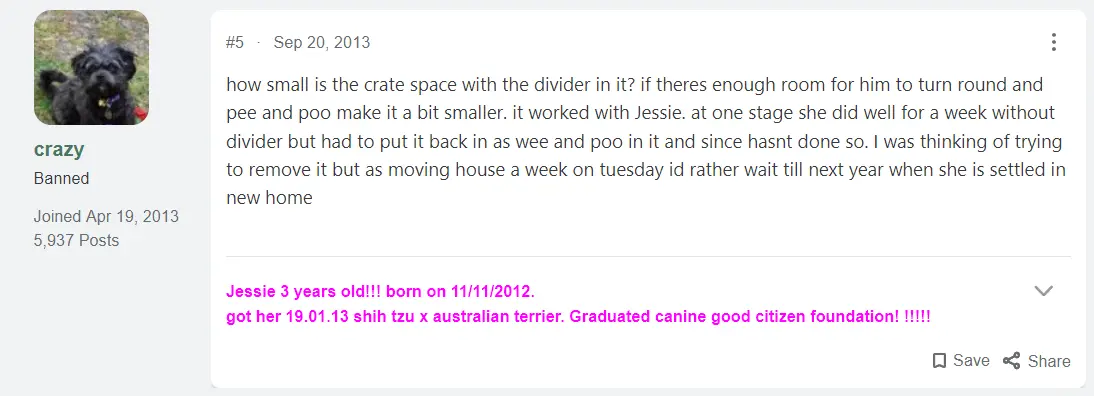
Look for the best crates for puppies.
6️⃣Change the bedding
Sometimes a puppy finds the bed material ideal for peeing. So try to choose a bed made of a different material, perhaps a thicker, smoother one. You can also use a mat for puppies. By the way, it’s convenient to wash it after accidents.
7️⃣Reduce anxiety and stress
A dog can become stressed if he’s in an uncomfortable environment. For example, if he’s confined in a small, dark room. Also, dogs that have experienced a traumatic event can be startled by sudden noises.
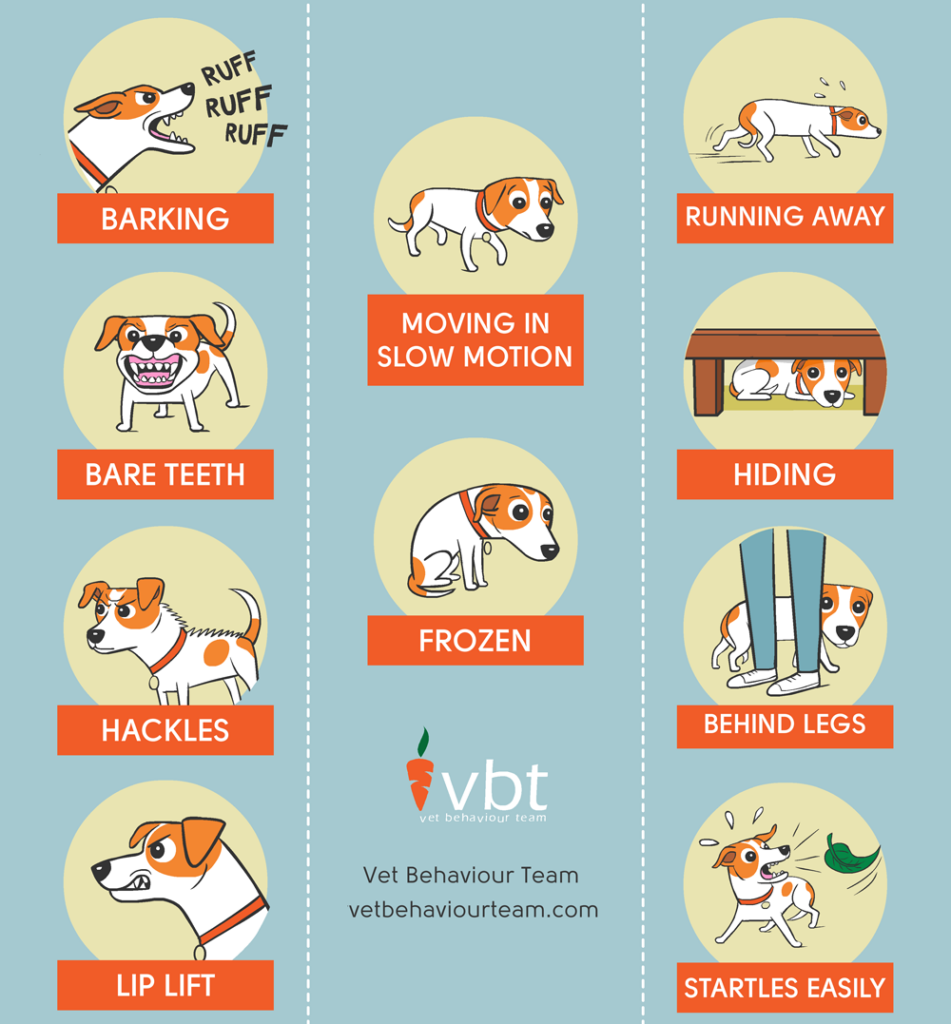
So make sure the crate is in a quiet but not completely isolated place.
What else can help a stressed dog?
- Exercise and mental stimulation can help relieve stress and anxiety by providing an outlet for your pup’s energy and keeping him mentally occupied. So make sure your puppy gets plenty of exercise and playtime every day.
- Calming Agents. You can use a variety of calming treats and scented oils and turn on white noise for your dog.
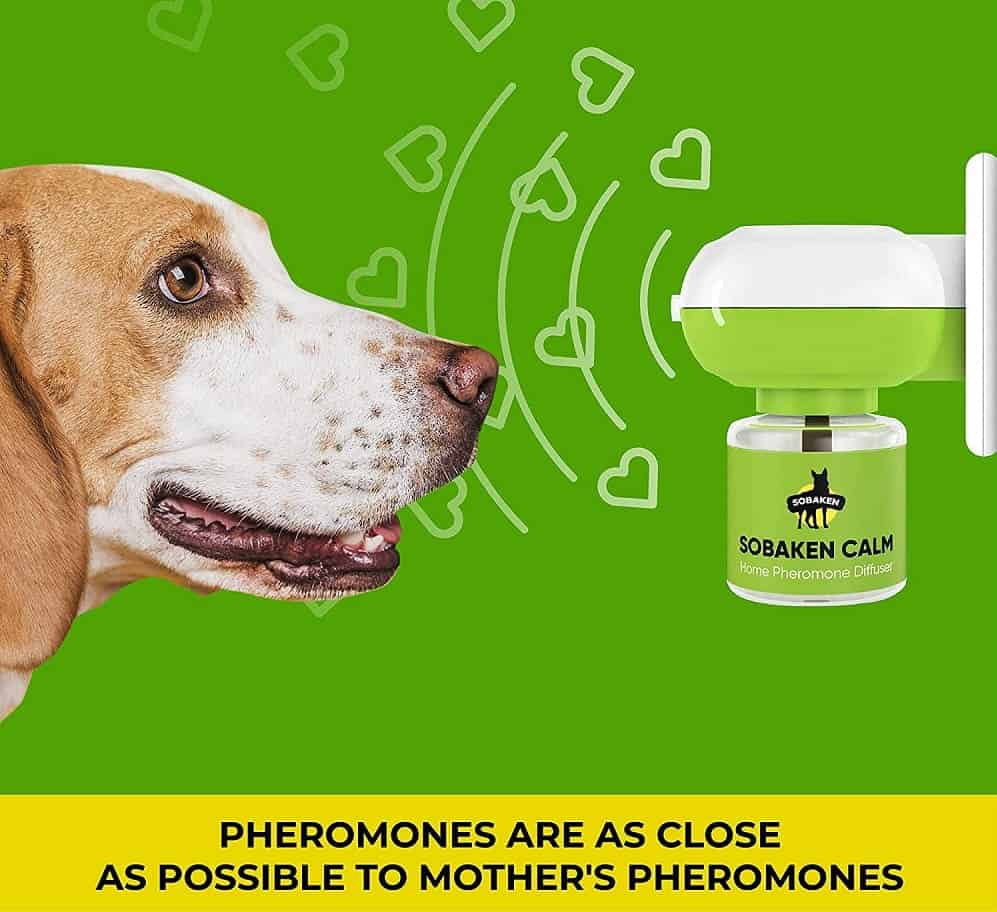
If your puppy’s stress-related peeing continues or becomes a serious problem, it’s important to consult with your veterinarian or a qualified animal behaviorist. They can help you develop an individualized plan that addresses your puppy’s specific needs and helps him feel more comfortable and confident.
8️⃣Help your puppy love his crate
Sometimes puppies pee in the crate to show their protest against it. This may be the result of improper training. To correct this, help your puppy get used to the crate. There is a lot of advice on this in my article “What to do if my puppy hates the crate“.
Here is some of it:
- Don’t lock him in, but leave the door open.
- Set up a comfortable bed and toys for him.
- Let him come there whenever he wants and reward him for this behavior.
- Feed your puppy in the crate to create a positive bond with it. You can use toys that are filled with food, such as Kong.
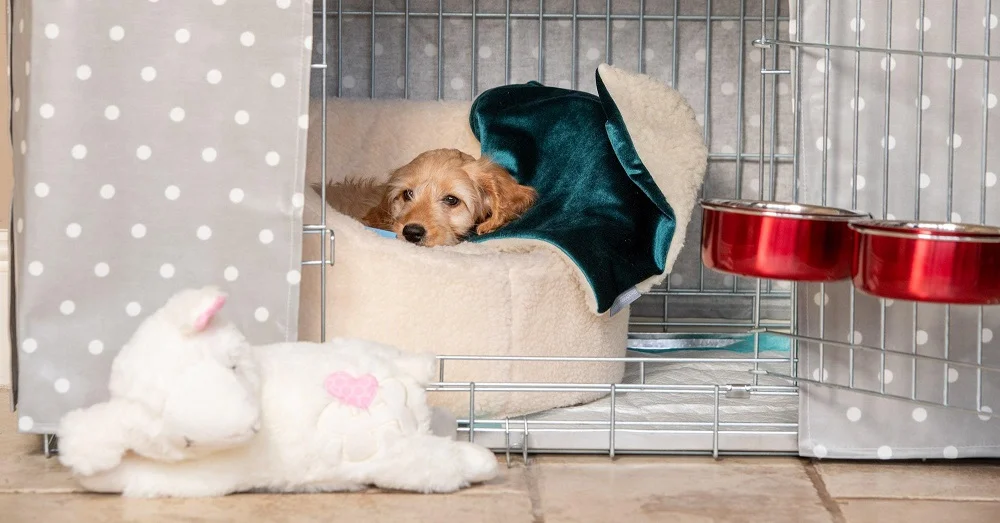
Don’t start locking your puppy until he is used to the crate and can get there on his own.
9️⃣Gradually increase the time
The first time, you should lock your puppy for a moment. Then you can increase the time to 1 minute or more, depending on how your dog responds.
Stay close at first, and when you feel the puppy is ready, leave him alone for a moment. Then increase the time by 1-2 minutes, 5-10 minutes, and so on.
🔟Don’t keep your puppy in the crate too long
Usually, you don’t need to keep your puppy in the crate for more than 1 hour. But if you want to leave him longer, you should determine how long your dog can stay in the crate. Stay within the allowed time. If you don’t have time to take the dog outside regularly, ask someone you know or hire a dog sitter.
Conclusions
How do I get my puppy to stop peeing in his crate? These are the main points on how to deal with this problem:
- A crate can be a helpful tool for potty training, but it’s essential to ensure it has the appropriate size and a comfortable and safe environment.
- Puppies have limited control over their bladders and need to go outside frequently, especially after eating, drinking and sleeping.
- Accidents are inevitable, but avoid punishing or scolding your puppy.
- Instead, focus on rewarding good behavior and establishing a routine that works for you and your puppy.
- If your puppy continues to have accidents in the crate, there may be an underlying medical or anxiety problem. This needs to be addressed with the help of a veterinarian or animal behaviorist.
Good luck to you and your puppy! Post in the comments what helped you solve this problem!😽
FAQ
How long can a puppy hold it’s bladder in a crate?
It depends on your puppy’s age and breed. As a general rule of thumb, puppies can hold their bladders for one hour per month of life plus one hour. For example, a 3-month-old puppy can hold his bladder for 4 hours.
Should I punish my puppy if he pees in the crate?
No, it’s not recommended to punish your puppy for peeing in the crate. Dogs don’t understand punishment as well as humans do, and it can cause fear and anxiety. Instead, focus on positive reinforcement training to encourage good behavior.
Is it okay to use pee pads in the crate?
Using puppy pads in the crate is generally not recommended, as they can confuse the puppy and make housetraining more difficult. Instead, establish a consistent routine for taking your puppy to potty outside.
What to do if my puppy pees in the crate overnight?
Take your puppy outside before bedtime and set the alarm to get him out at night if needed.
How can I tell if my puppy is scared or stressed in the crate?
Signs of anxiety or stress in a puppy include whining, running, excessive barking or howling, destructive behavior, and attempts to escape from the crate. If you notice these behaviors, you should address the underlying anxiety or stress issues and adjust your crate training program.
Why does my puppy pees in his crate after being outside?
The most likely causes include stress and fear or bladder disease. It is also possible that your puppy doesn’t like the crate because he hasn’t been trained properly.
Sources:
What to Do if Your Puppy Keeps Going Potty in the Crate
How to crate train your dog in 9 easy steps (AKS.org)
Crate Training Your Puppy at Night
Puppy Peeing In Crate: 7 Tips To Stop Them
Related video:
- How to make OUTDOOR DIY dog potty area - June 18, 2023
- BEST dog organization ideas to keep your home tidy - June 1, 2023
- 10 Best behaved dog breeds - May 29, 2023